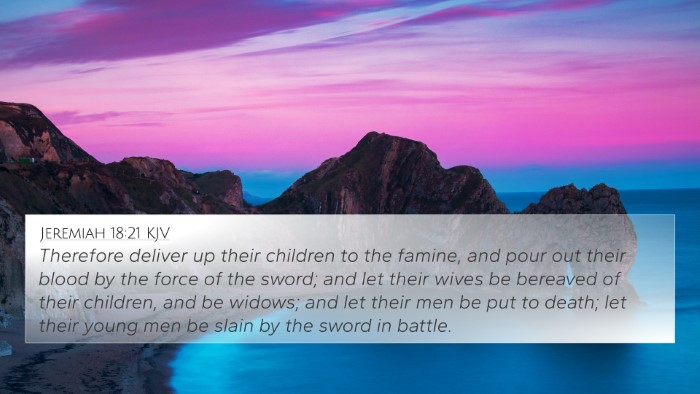Understanding Isaiah 3:25
Isaiah 3:25 presents a poignant verse that speaks of the fate of God’s people during a time of judgment and crisis. The verse states:
“Your men shall fall by the sword, and your mighty in the war.”
Verse Meaning and Interpretation
This verse highlights the inevitable outcome for those who oppose God. Insights from Matthew Henry emphasize the futility of human strength and valor in the face of divine judgment. Adam Clarke notes that the ‘men’ mentioned are those who once stood in strength but will now face collapse.
Contextual Analysis
Isaiah 3 discusses the judgment that comes upon Jerusalem and Judah due to their sins and rebellion against God. This verse serves to illustrate the consequences that the nation will face due to their unfaithfulness. Albert Barnes elaborates that the loss of men in battle symbolizes a loss of leadership, security, and hope for the community.
Thematic Connections
- Divine Judgment: The theme of divine judgment is prevalent throughout the Book of Isaiah, where the text often reflects the consequences of societal failure to uphold God's commands.
- Human Fragility: The contrast between human strength and divine power serves as a continual reminder of reliance on God.
Cross-References
Understanding Isaiah 3:25 can be enriched through cross-references. Here are several relevant passages:
- Jeremiah 46:5-6: This passage echoes the idea of the fallen warriors in judgment.
- Lamentations 1:15: Reflects despair in the face of divine wrath.
- Isaiah 10:16-19: Discusses God's judgment against the proud.
- Psalm 44:9-11: Acknowledges defeat despite God’s choosing of Israel.
- Isaiah 27:7: Compares divine punishment with human retaliation.
- Micah 3:12: Foretells of the destruction of Zion for its sins, similar to Jerusalem's fate.
- Revelation 19:21: References the final judgment and defeat of opposition against God.
- Romans 1:18: Discusses the wrath of God revealed from heaven against unrighteousness.
- Job 18:12: Speaks of the downfall of the mighty who oppose God.
- Matthew 24:6-8: Jesus foretells tribulations in the end times reflecting societal consequences.
Conclusion
Isaiah 3:25 stands as a stark warning about the reliance on human strength without acknowledgment of God’s sovereignty. By cross-referencing with other biblical texts, we find profound insights into the themes of judgment, human frailty, and divine sovereignty, enhancing our understanding of this verse. In Bible studies, utilizing tools for Bible cross-referencing, such as a Bible concordance or Bible cross-reference guide, can further deepen this exploration.
Further Study and Reflection
As you consider the connections among various Bible verses, think about how these insights inform your understanding of God's character and the nature of judgment. Engaging with cross-referencing Bible study methods can reveal deeper connections and enhance scriptural comprehension. This reflective journey is an invitation to see how God’s narrative unfolds through both the Old and New Testament, revealing layers of meaning and application for today’s believer.











